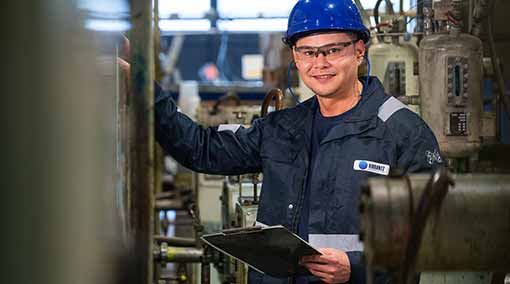We’re experts and innovators focused on solving challenges, embracing change and growing.
Addressing challenges in PVC foam
Polyvinyl chloride (PVC), a synthetic plastic polymer, is widely valued for its durability, strength and moisture resistance, making it a key component in construction materials, medical devices and foams. To create PVC foams, blowing agents are used to form gas-filled cells within the material, reducing weight and adding insulation properties.
Foamed PVC can be found in various everyday applications, including:
- Construction: Used in wall panels, flooring, ceilings, wallpaper and insulation
- Automotive: Incorporated in interior panels, dashboards and seats for lightweight and durability
- Textiles: Found in upholstery, artificial leather and fabrics
- Consumer Goods: Used in toys, footwear and other everyday items due to its versatility and cost-effectiveness
- Packaging: Employed in protective packaging solutions because of its cushioning properties



PVC foam provides advantages like weight reduction, high strength and insulation properties, softness and impact resistance. However, the most commonly used blowing agent, azodicarbonamide (ADCA), poses significant health risks, being classified as a respiratory sensitizer and a Substance of Very High Concern (SVHC) by REACH legislation. This raises the demand for safer, more sustainable alternatives to meet modern production and environmental standards.
PVC foam is manufactured by several methods, but it always includes poly vinyl chloride, plasticizers fillers, stabilizers, lubricants, pigments and blowing agents. The blowing agent decomposes when the liquid PVC (plastisol) turns solid, resulting in controlled closed-cell formation and expansion. While liquid physical blowing agents vaporize during heating, solid chemical blowing agents, such as ADCA, release gas at specific temperatures, which helps in the foaming process. However, the health and environmental concerns associated with ADCA highlight the urgent need for safer options in the industry.
Next generation blowing agent is transforming flexible PVC and rubber foam production
Brussels-based chemical company Solvay recently introduced an innovative and eco-friendly chemical foaming agent, Alve-One®, which offers a sustainable alternative to traditional blowing agents like ADCA. Alve-One is an endothermic agent based on sodium bicarbonate that decomposes into water and CO2, significantly reducing environmental impact.
Compared to ADCA, it presents an 85-95% lower footprint in terms of CO2 emissions, water usage and non-renewable energy consumption, making it an environmentally friendly choice throughout its lifecycle.
In collaboration with Solvay, Vibrantz has developed plasticizer-based dispersions of Alve-One® that facilitate easy handling and precise automatic dosing during production. These dispersions optimize the blowing agent’s use in PVC foam manufacturing, ensuring efficient distribution and enhancing the final product’s quality. Additionally, Vibrantz offers pigment dispersions for flexible PVC, enhancing both safety and performance in PVC foam applications.
Committed to sustainable solutions, both Vibrantz and Solvay aim to reduce health risks and enhance recyclability, contributing to a greener future for PVC foam products. Explore our dispersions used to elevate the everyday here.




 28 July 2023
28 July 2023 3 mins
3 mins 


 Learn more
Learn more